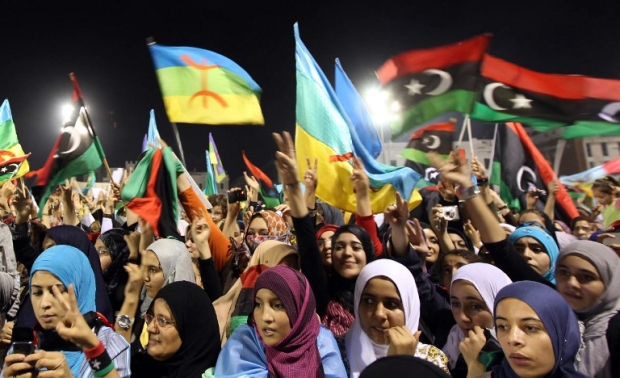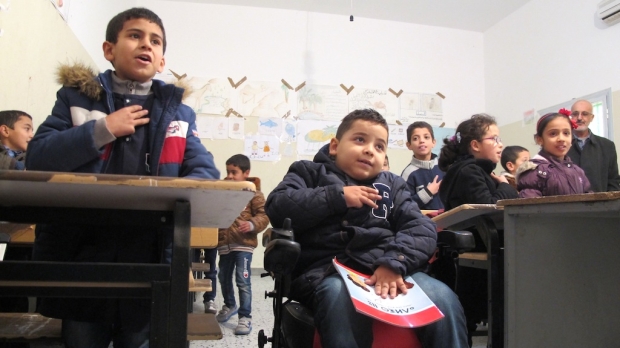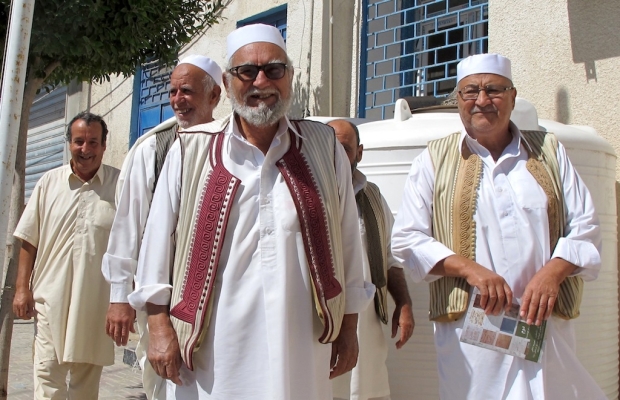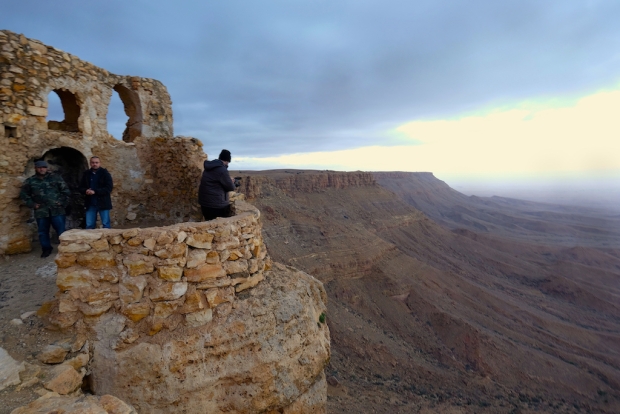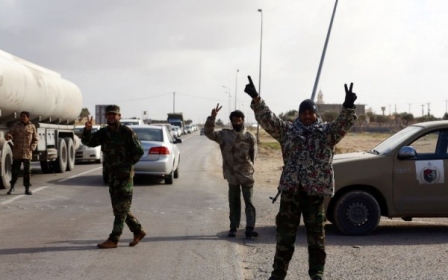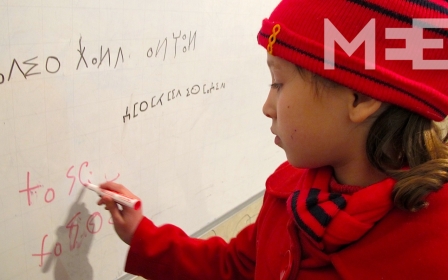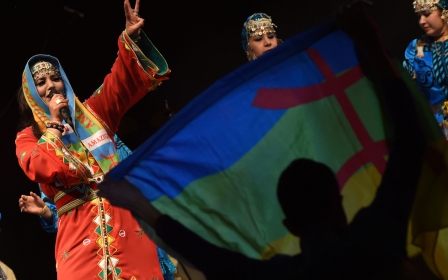'Autonomy is a right': Amazigh minority fights for rebirth amid Libyan chaos
JADU, Libya - Although the Amazigh Supreme Council (ASC) is not vying for power across the war-torn country, if there were to be a fourth government in Libya, it would be here at its fancy, three-storey headquarters in west Tripoli.
Funded by Libya’s Amazigh community, the building houses the council governing the main areas of Libya's largest minority. But more importantly it provides a sense of unity for the Amazigh who are indigenous inhabitants of North Africa, with a population extending from Morocco’s Atlantic coast to the west bank of the Nile in Egypt.
'We’ve been accused of separatism since Gaddafi's times and the post-war governments have maintained the same narrative'
- Emhemed Bentalab, Amazigh Supreme Council
Unofficial estimates put the number of Amazigh in Libya at almost 600,000, or about 10 percent of the total population.
After years of discrimination and repression under former Libyan leader Muammar Gaddafi, the past seven years have seen the group gain recognition and rights, and organise themselves.
Yet even with these wins, the Amazigh are struggling to protect themselves and their territory which stretches from the coastal enclave of Zuwara, 100km west of Tripoli, to the Nafusa mountains southwest of the capital.
With control of both border crossings into Tunisia, they are regularly under attack by forces either loyal to Tripoli or Tobruk. Just last week, forces loyal to the UN-backed government launched an attack on Amazigh fighters in Zuwara.
They are also still fighting for their language rights: drafts of the Libyan constitution, which is being revised, have shown no sign of recognising Tamazight, the Amazigh language. Earlier this month, an Amazigh activist was abducted by forces loyal to the eastern government of Tobruk and accused of espionage for using the language.
But the council presses on, bringing together members of the Amazigh at the Tripoli headquarters to meet.
“We bought this building using private donations from among our own people,” ASC vice-president Emhemed Bentalab told Middle East Eye as he walked through dark rooms after yet another power cut.
They meet when - and if - security conditions allow them to travel from their areas. One area is Zuwara, but their main stronghold is in the Nafusa mountains.
According to Bentalab, Libya's Amazigh have been accused of separatism since Gaddafi's times and post-war Libya doesn't look much better for them.
This year, Libya was ranked 11th in a list of countries with "peoples under threat", just behind Myanmar, according to the NGO Minority Rights Group International. Syria topped the list.
Bentalab was blunt about the minority’s “most basic demands”.
“In this changing environment in Libya, all options are on the table, including autonomy. Self-determination is one of the rights of our people as clearly set in the United Nations Declaration on the Rights of Indigenous Peoples,” he said.
Long forbidden language
Despite recent significant changes to advance the rights of the Amazigh in Libya, memories of the recent past remain fresh in the minds of many members of the community.
Under Gaddafi's ‘cultural revolution’ launched from Zuwara in 1973, the Amazigh were identified as Arabs and their language as “a mere dialect”. Non-Arab names were forbidden, Amazigh organisations were banned and anyone involved in the cultural revival of the Amazigh was prosecuted.
It wasn’t until Gaddafi lost control over Libya in the spring of 2011 that the first schools and publications in Tamazight, the long-forbidden Amazigh tongue, popped up across Amazigh villages.
Over the past six years, Amazigh school books have gradually been released and Tamazight has become a language taught at primary schools, and even universities.
At the beginning of these efforts, the lack of Amazigh teachers in Libya forced Nafaa Malti, head of the Tamazight department at the University of Zuwara, to rely on Amazigh teachers he brought in from Algeria and Morocco.
But according to Malti, bureaucracy has been a bigger hurdle in establishing this new foundation.
'Nobody seems to understand the importance of education, but we do'
- Nafaa Malti, University of Zuwara
“I spent eight months trying to get the required backing from 32 people in the authorities so we could launch the new department. After that, I had to get the approval of the minister of education and even Libya's grand mufti,” recalled Malti.
Despite these obstacles, he said, the efforts have been worth it.
“The rest of the country is too busy in fighting each other. Nobody seems to understand the importance of education, but we do.”
An Ibadi community
Zuwara's main square, a 15-minute walk from Zuwara University, was built during the Italian occupation (1910-1947) and locals still refer to it simply as the piazza.
In this square, there is a hotel, several grocery shops, a street market and a mosque which is the heart of the Ibadi community on the Libyan coast.
Right next to the mosque, the doors of the Abdurrahman Elouali Association of Ibadi Studies are open for anyone curious about Ibadism.
From its library, Sheikh Abdulaziz, co-founder of the association, claims to be among several Ibadi sheikhs jailed during Gaddafi's times.
Last August, Libya’s Supreme Fatwa Committee, the religious arm of the country's eastern government, released a fatwa which labelled Ibadis as “a misguided and aberrant group” and “infidels without dignity".
'As it happens, we got support from several intellectuals as well as senior Sunni leaders so it has actually been a positive thing for us'
- Issa Nobar, Zuwara's Ibadi Association
While Sheikh Issa Nobar, also a member of Zuwara's Ibadi Association, believes the fatwa was more political than religious, it had an unexpected effect.
“As it happens, we got support from several intellectuals as well as senior Sunni leaders so it has actually been a positive thing for us,” said Nobar.
Valerie Hoffman, professor of Islamic studies at the University of Illinois and an expert on the Ibadi community, pointed to one contradictory yet positive duality.
“In theory, we could say Ibadism is a rigorist and conservative vision of Islam, but in practice they have historically been very tolerant,” the academic told MEE. “Any hostile action is reserved for one type of person: the unjust ruler who refuses to mend his ways or relinquish his power."
But Zuwara is a coastal town in a flat sandy area. Without steep cliffs to protect locals, particularly from Gaddafi loyalists who live in nearby villages, their safety is jeopardised.
African and proud
Taking the direct route between Zuwara on the coast and the Amazigh stronghold in the mountains of Nafusa involves crossing several checkpoints, manned by rival militias.
Instead, the safest route crosses into Tunisia and back to Libya, across the Dehiba-Wazzin border, up into the mountains.
That is why this November, Fathi Ben Khalifa felt reassured when he finally spotted the trilingual signage - in Tamazight, English and Arabic - indicating his return to the boundaries of Jadu, one of Nafusa's biggest Amazigh villages.
The well-known Libyan Amazigh dissident and president of the World Amazigh Congress was in Jadu to gather support for a new Amazigh-Touareg political party ahead of local elections set for later this year.
Thousands had gathered in Ubari, a mainly Touareg area, on 18 November as Ben Khalifa and other party founders held a celebration to launch the party, called Libo.
Reactions from potential political rivals came in a cascade. Mahmoud Jibril, the interim prime minister of Libya in 2011, accused Ben Khalifa of "trying to turn Libya into an African country” during an interview with the Jordan-based 218TV channel.
'We have to remind our fellow Libyans that no matter what language we speak, we’re a North African country, and not a Gulf state'
- Fathi Ben Khalifa, leader of the Libo Party
As he rallied support in Jadu, Ben Khalifa told the local council that the party - which he said was named after an Amazigh tribe - had been ready to run in elections since 2013, but that the conditions for political change “were not ideal".
Libo’s programme focuses on using secularism “to face the growth of radical Islam”, gender equality and minority rights.
The name of the party is written in Tamazight, Arabic and Tubu - an indigenous language of a sub-Saharan ethnic group living in the region crisscrossed by the borders of Libya, Chad and Niger.
“We have to remind our fellow Libyans that no matter what language we speak, we’re a North African country, and not a Gulf state,” said Ben Khalifa.
As he concluded his speech, questions from the attendees piled up with some showing a level of suspicion towards the party and its leader.
"Is it true you visited Israel?” asked one of the attendees.
Given the support some of Libya’s three governments are receiving from regional powers, including Saudi Arabia and Qatar, another audience member asked: "Who is backing you?"
Ben Khalifa quickly insisted that the party was not receiving any foreign support. “All Libyan militias, parties, and media platforms... are supported from the outside, except for us," he said.
“Why? That’s simply because we are not ready to sell ourselves or our country,” he explained.
This article is available in French on Middle East Eye French edition.
New MEE newsletter: Jerusalem Dispatch
Sign up to get the latest insights and analysis on Israel-Palestine, alongside Turkey Unpacked and other MEE newsletters
Middle East Eye delivers independent and unrivalled coverage and analysis of the Middle East, North Africa and beyond. To learn more about republishing this content and the associated fees, please fill out this form. More about MEE can be found here.


